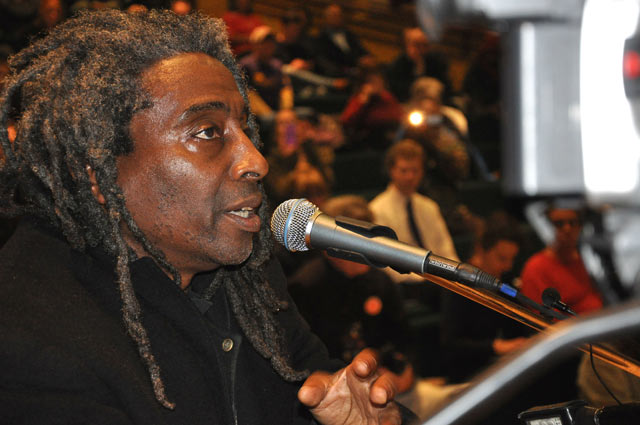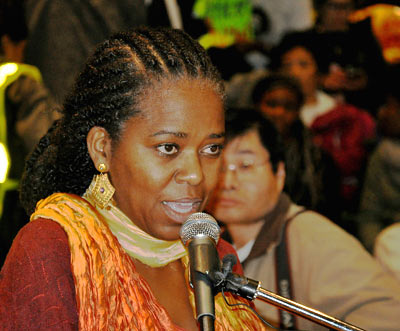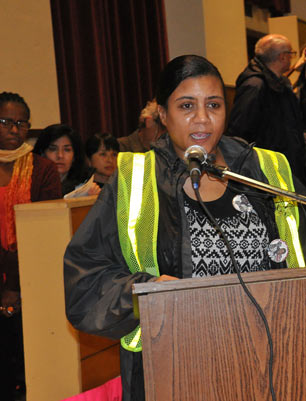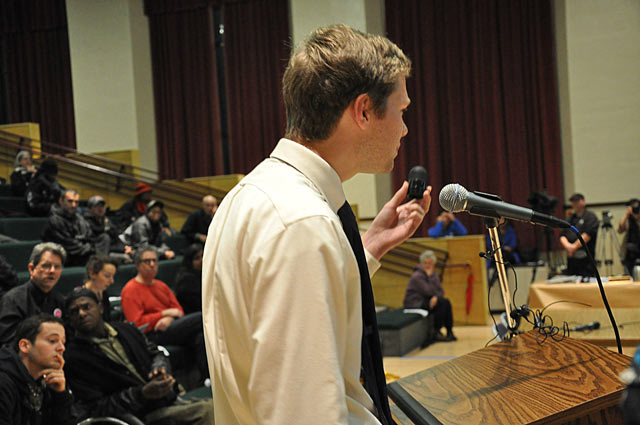
More than 100 people came to a raucous Berkeley City Council meeting to vent their anger at what they said was police use of excessive force at Dec. 6 protests against the grand jury decisions not to indict white police officers in the deaths of Michael Brown in Ferguson, Mo, and Eric Garner in Staten Island.
But many of those lining up to speak had hoped for more than an opportunity to vent. They wanted city council action.
Council action on urgency issues not on the agenda requires a two-thirds vote. The three progressives, Councilmembers Kriss Worthington, Jesse Arreguin and Max Anderson, urged the council to do so in order to discuss a Police Review Commission recommendation to temporarily ban police use of tear gas, over the shoulder baton strikes and firing projectiles.
Police used all three against protesters Dec. 6, contending that they were the object of bricks and bottles thrown by protesters.
The council refused to address the recommendation and also turned down a separate motion calling for a council meeting within a week on the issue.
Mayor Tom Bates, loudly heckled by the crowd, instead called a meeting for Jan. 17, where he said “experts” would discuss relevant issues.
But Anderson argued, “These are urgent matters. If someone on this dais is hoping that passions will cool (by Jan. 17) and things will go away, you’ve got another thing coming. If we don’t act with expeditious intent then people will be justified in making the judgment that we’re shirking our responsibilities.”
Speakers addressed what they said was excessive force.
 Moni Law tells the City Council she was bruised when pushed from behind by a police officer’s baton when protesting peacefully in Berkeley Dec. 6. (Photo: Judith Scherr)African American activist Moni Law said she was protesting peacefully on Dec. 6. when she was “punched in the back with a Billy club.”
Moni Law tells the City Council she was bruised when pushed from behind by a police officer’s baton when protesting peacefully in Berkeley Dec. 6. (Photo: Judith Scherr)African American activist Moni Law said she was protesting peacefully on Dec. 6. when she was “punched in the back with a Billy club.”
“I’m not against police,” Law said. “I’m against brutality.”
Another speaker was Maria Moore, sister of Kayla Moore, the African American transgender schizophrenic woman who died in police custody in 2013 after friends had called for help due to Moore’s bizarre, but not threatening, behavior.
 Maria Moore tells the council that police were called to help her schizophrenic transgender sister Kayla Moore, but ended up arresting her; six officers sat on Kayla to handcuff her, after which she died. (Photo: Judith Scherr) “We live in a culture where individuals of color suspected of minor crimes are met with a police presence that leads to lethal force,” Moore said. “Police blame the victims. Eric Garner choked to death – that was his fault – he resisted; Michael Brown was a thug, he had it coming; Kayla Moore was mentally ill.”
Maria Moore tells the council that police were called to help her schizophrenic transgender sister Kayla Moore, but ended up arresting her; six officers sat on Kayla to handcuff her, after which she died. (Photo: Judith Scherr) “We live in a culture where individuals of color suspected of minor crimes are met with a police presence that leads to lethal force,” Moore said. “Police blame the victims. Eric Garner choked to death – that was his fault – he resisted; Michael Brown was a thug, he had it coming; Kayla Moore was mentally ill.”
Barbara White, vice president of the Berkeley NAACP, also linked Ferguson and Berkeley. Berkeley has failed to implement a program to collect data on the race of people stopped by police. She said the issue is bigger than the “appalling” deaths of Brown and Garner.
“It’s structural racism in America that’s not being addressed,” White said. “Black lives matter. They matter all the time in every area of life. We want to eat. We want a job. We want housing. We want our kids to be educated. And certainly, we want to go out in the street and not be killed.”
 Stefan Elgstrand shows the City Council a projectile he said was shot into the crowd by Berkeley police Dec. 9. (Photo: Judith Scherr)
Stefan Elgstrand shows the City Council a projectile he said was shot into the crowd by Berkeley police Dec. 9. (Photo: Judith Scherr)
Join us in defending the truth before it’s too late
The future of independent journalism is uncertain, and the consequences of losing it are too grave to ignore. We have hours left to raise the $12,0000 still needed to ensure Truthout remains safe, strong, and free. Every dollar raised goes directly toward the costs of producing news you can trust.
Please give what you can — because by supporting us with a tax-deductible donation, you’re not just preserving a source of news, you’re helping to safeguard what’s left of our democracy.